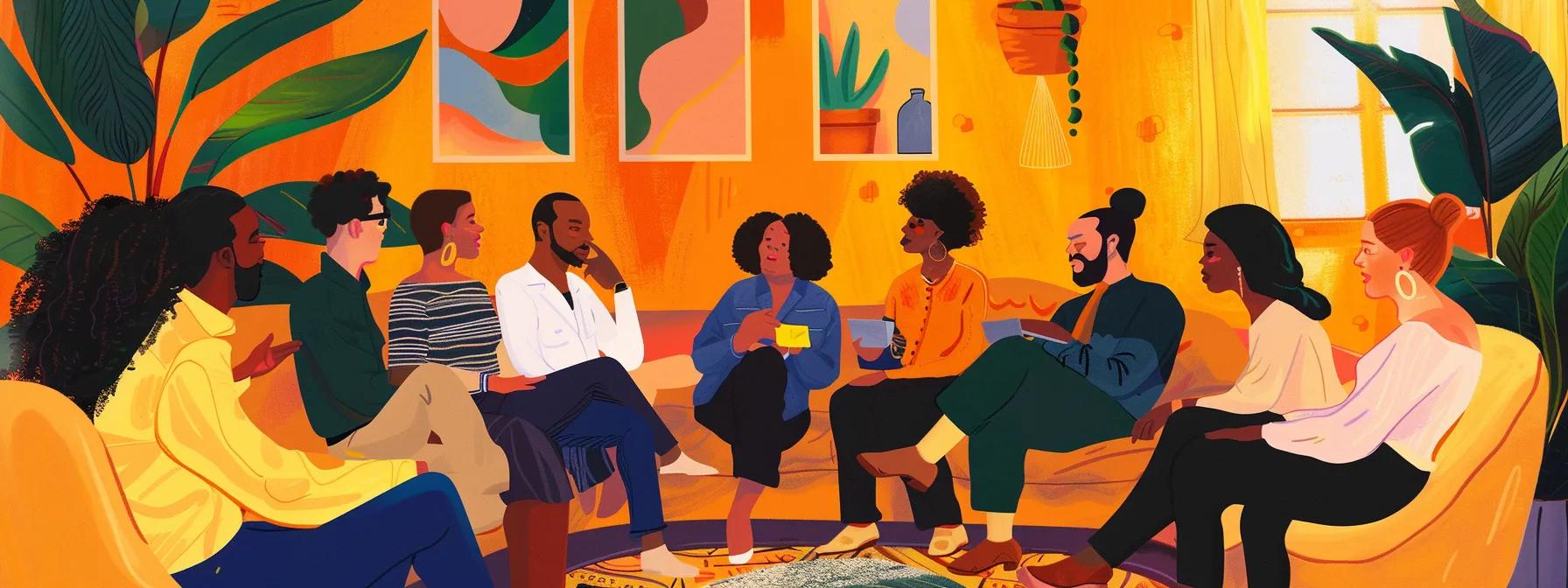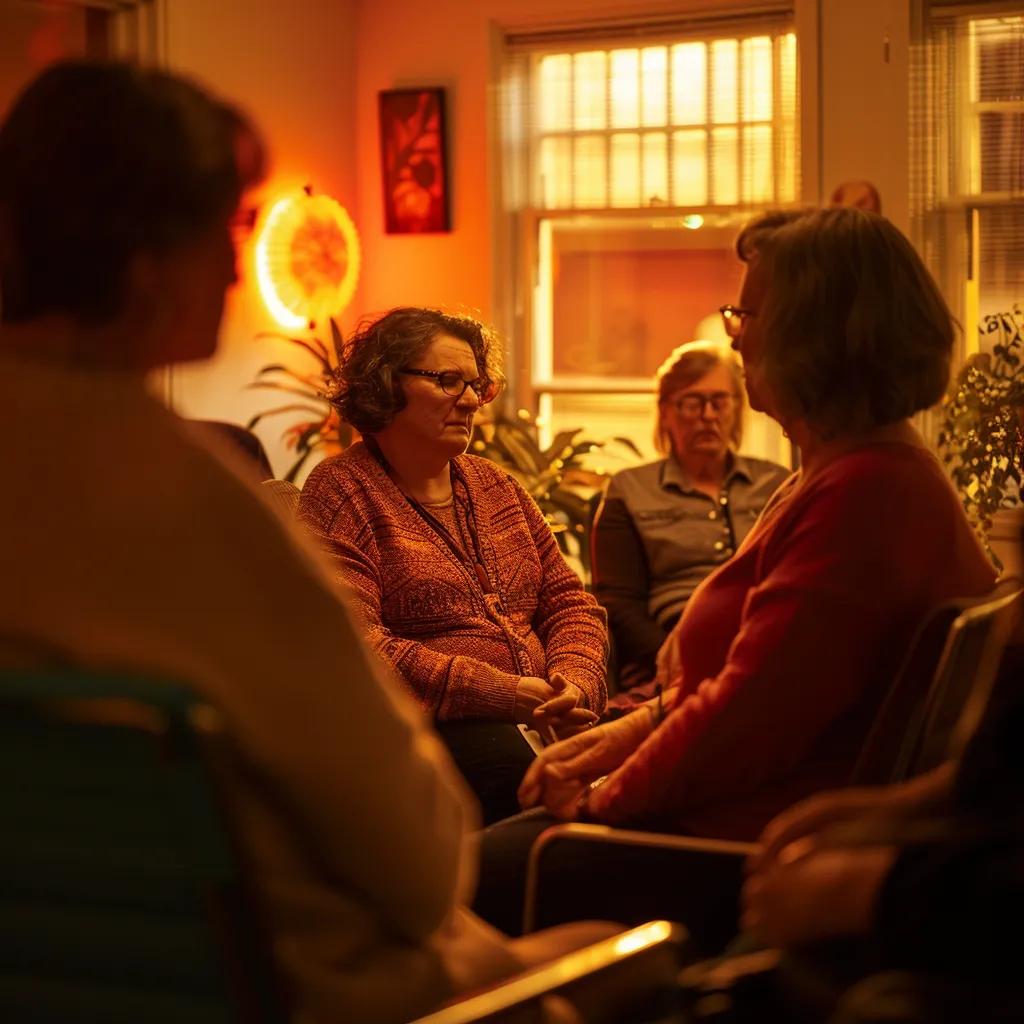The Healing Power of Shared Experience
At Renova Wellness & Consulting, group therapy is more than a format—it’s a philosophy rooted in the belief that healing is magnified when done in community. Group settings offer a unique therapeutic dynamic that can’t be replicated in individual therapy. For those struggling with trauma, addiction, social anxiety, or depression, sharing space with others who understand their journey often leads to breakthroughs that silence and isolation cannot produce.
Rather than a collection of individuals receiving the same advice, group therapy works through connection. Clients listen, reflect, support, and learn from one another in real-time. These shared experiences generate compassion, reduce shame, and build resilience. The presence of others going through similar challenges reminds participants that they are not alone and that healing is possible—not just for one, but for all.
This collective process inspires participants to dig deeper into their own healing journey. Observing others make progress instills hope, and the mutual encouragement fuels individual motivation. When guided by experienced facilitators, the group becomes a trusted container for emotional growth, accountability, and transformation. In essence, each member becomes both a healer and one being healed.
Privacy and Safety in Group Therapy
A primary concern for many entering group therapy is the issue of privacy—how can vulnerability exist in a room full of strangers? At Renova, creating a safe, respectful, and confidential space is a top priority. Every potential participant undergoes a thorough screening process to ensure that the group dynamic will foster healing and not harm. Clients are placed carefully based on their needs, conditions, and readiness for open sharing.
Ground rules for communication are established early and reinforced regularly. These guidelines include strict confidentiality agreements, respectful listening practices, and clear boundaries around giving advice. They serve as emotional guardrails, ensuring everyone feels protected while navigating their inner world. The result is a structure that empowers honesty and guards against judgment or breach of trust.
Skilled facilitators play a central role in maintaining this secure atmosphere. Each group is led by licensed professionals trained to recognize escalating emotions, mediate tension, and redirect conversations constructively. Their steady presence ensures that all voices are heard, boundaries are respected, and that the integrity of the group experience is preserved throughout each session.
Creating a Personalized Fit Within the Group
Effective group therapy depends on more than gathering people with similar diagnoses. At Renova, group composition is strategically designed to ensure compatibility, shared focus, and emotional alignment. Clients are grouped with others facing similar challenges—such as trauma, substance use, or anxiety—to foster authentic conversations and eliminate the need for excessive explanation.
Every session is customized through a modular design that reflects the evolving needs of its members. For example, a group navigating early recovery might focus on managing triggers one week and relapse prevention the next. This adaptive structure means therapy stays fresh and relevant, avoiding the pitfalls of generic group formats. Facilitators curate content around participants’ real-time challenges, ensuring that the dialogue is not only useful, but immediately applicable.
Participant feedback is a core element of this personalized approach. Clients are invited to share reflections after sessions, suggest discussion topics, and highlight areas they’d like more support in. This continuous feedback loop ensures that the group evolves with its members, always aligned with their therapeutic goals and emotional readiness.
Comparing Group and Individual Therapy Outcomes
While individual therapy offers privacy and one-on-one attention, group therapy introduces an invaluable collective dimension. At Renova, outcome tracking has shown that for many clients, group therapy is equally effective—sometimes more so—than individual sessions. The shared accountability, diverse insights, and consistent structure create a fertile ground for growth.
Quantitative data supports this. Renova tracks participant progress over time by measuring shifts in mood, behavior, coping skills, and overall functioning. Comparative analysis between group and individual formats often reveals parallel rates of improvement, particularly for clients managing addiction, trauma, or relational difficulties. This data affirms that group therapy is not a “second-tier” option, but a clinically validated path to wellness.
Client satisfaction further underscores this success. Participants regularly report that the group setting fosters deeper insight, stronger motivation, and a sense of belonging that enhances their emotional resilience. Many continue to participate in alumni groups long after treatment ends, using the relationships they built in therapy as part of their long-term support network.

Specialized Techniques and Ongoing Peer Support
Renova’s approach to group therapy is enhanced by its use of specialized therapeutic modalities. Instead of relying solely on talk-based discussion, groups often incorporate evidence-based methods such as Eye Movement Desensitization and Reprocessing (EMDR), Acceptance and Commitment Therapy (ACT), and trauma-informed interventions. These methods are integrated in ways that respect the group setting while still delivering individualized benefits.
Sessions often include experiential exercises, guided reflections, and skill-building activities tailored to the group’s shared goals. For trauma groups, this might mean grounding techniques or body-based mindfulness practices. For addiction recovery, the focus could shift to managing cravings or repairing relationships. These techniques ensure that sessions are not only engaging, but clinically impactful.
Beyond structured sessions, Renova maintains an active alumni community. Former clients are invited to participate in monthly peer-led gatherings and mentorship programs. These connections provide long-term emotional support and continuity, allowing healing to continue well after formal therapy has ended. It’s a model that values relationship, not just resolution.
Adjusting Treatment Over Time
At Renova, group therapy is never static. It is an evolving process, shaped continuously by clinical feedback, client progress, and session dynamics. Therapists routinely assess whether clients are benefitting from their current group or might be better served in another format—such as transitioning to individual therapy for deeper exploration.
Progress is measured through session evaluations, therapist observations, and self-reported outcomes. These markers help determine when to adjust the pace, shift focus, or introduce new interventions. If a group member begins to outpace the rest of the group or requires more intensive support, the therapist will guide a smooth transition to a different care path—always with the client’s comfort and therapeutic goals in mind.
This flexibility ensures that no one feels stuck or underserved. Instead, each client experiences group therapy as a dynamic, responsive journey—one that supports growth while honoring individuality. It’s a system designed to adapt in real time to real needs.
Culturally Sensitive and Inclusive Group Experiences
Renova understands that meaningful healing can only occur when participants feel seen, heard, and respected. That’s why cultural sensitivity is embedded into every aspect of group therapy—from facilitator training to session design. Groups are composed not only based on clinical need but with attention to racial, cultural, and identity diversity, ensuring that no one feels like an outsider.
Therapists receive ongoing education in culturally competent care, equipping them to address microaggressions, bias, and intersectional trauma. This enhances the emotional safety of the group and allows participants to engage authentically without fear of dismissal or misunderstanding.
Inclusivity is not a slogan at Renova—it’s a practice. Participants are encouraged to share how their cultural background impacts their mental health journey. These conversations deepen empathy, widen perspective, and make the healing process richer and more relevant for everyone in the room.
Building Long-Term Support Through Alumni Networks
Healing doesn’t end when the last session concludes. Renova fosters ongoing recovery by building long-term connections between clients. After completing a therapy group, clients are invited into an alumni network that provides continued access to peer support, resource sharing, and occasional booster sessions led by facilitators.
These groups serve as a bridge between formal treatment and real-world application. They allow former clients to reflect on their growth, celebrate milestones, and return for guidance when new challenges arise. It’s a safety net and a social community rolled into one—a space that nurtures resilience and sustains progress.
This extended care model reinforces Renova’s philosophy: that healing is a lifelong journey best traveled in good company.
Conclusion: A Collective Path to Individual Healing
Group therapy at Renova Wellness & Consulting is more than just a method—it’s a movement. It proves that healing can be both deeply personal and profoundly communal. Through shared experiences, strategic facilitation, and individualized attention, participants access breakthroughs that are often unreachable in isolation.
From the first intake to the final session and beyond, Renova tailors each group experience to the needs, identities, and goals of its clients. The result is a powerful, structured, and safe environment where personal growth happens in tandem with community support.
For anyone seeking to heal not just alone, but alongside others who understand, group therapy at Renova offers a path to recovery paved with empathy, empowerment, and enduring connection.
Request your appointment today!
Renova Wellness & consulting
801-317-8522 & info@renovawc.com
10694 S River Front Pkwy, South Jordan, UT 84095
Related Articles
Chronic Pain Clinics in Salt Lake City, New Techniques for Chronic Pain, Chronic Pain Treatments, Chronic Pain Alternative Treatments, Local Physical Therapy Pain Management, Acute Pain Management
FAQs
How does group therapy compare to individual therapy?
Group therapy offers unique advantages such as shared insight, peer encouragement, and reduced isolation. For many people, it is just as effective as individual therapy—especially when expertly facilitated.
Will my privacy be protected in group therapy?
Yes. Renova enforces strict confidentiality guidelines and carefully screens all participants to ensure a safe, respectful environment.
Is group therapy effective for addiction and trauma?
Absolutely. Group therapy can be especially powerful for people facing addiction or trauma, as it offers shared understanding and accountability that individual therapy alone may not provide.





